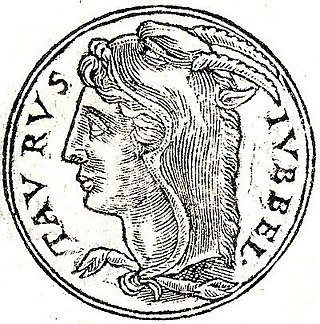Related Research Articles

The gens Petronia was a plebeian family at ancient Rome. This gens claimed an ancient lineage, as a Petronius Sabinus is mentioned in the time of Lucius Tarquinius Superbus, the last of the Roman kings, but few Petronii are mentioned in the time of the Republic. They are frequently encountered under the Empire, holding numerous consulships, and eventually obtaining the Empire itself during the brief reign of Petronius Maximus in AD 455.

The gens Julia was one of the most prominent patrician families in ancient Rome. Members of the gens attained the highest dignities of the state in the earliest times of the Republic. The first of the family to obtain the consulship was Gaius Julius Iulus in 489 BC. The gens is perhaps best known, however, for Gaius Julius Caesar, the dictator and grand uncle of the emperor Augustus, through whom the name was passed to the so-called Julio-Claudian dynasty of the first century AD. The nomen Julius became very common in imperial times, as the descendants of persons enrolled as citizens under the early emperors began to make their mark in history.

The gens Aurelia was a plebeian family at ancient Rome, which flourished from the third century BC to the latest period of the Empire. The first of the Aurelian gens to obtain the consulship was Gaius Aurelius Cotta in 252 BC. From then to the end of the Republic, the Aurelii supplied many distinguished statesmen, before entering a period of relative obscurity under the early emperors. In the latter part of the first century, a family of the Aurelii rose to prominence, obtaining patrician status, and eventually the throne itself. A series of emperors belonged to this family, through birth or adoption, including Marcus Aurelius and the members of the Severan dynasty.
Publius Pomponius Secundus was a distinguished statesman and poet in the reigns of Tiberius, Caligula, and Claudius. He was suffect consul for the nundinium of January to June 44, succeeding the ordinary consul Gaius Sallustius Crispus Passienus and as the colleague of the other ordinary consul, Titus Statilius Taurus. Publius was on intimate terms with the elder Pliny, who wrote a biography of him, now lost.
The gens Scribonia was a plebeian family of ancient Rome. Members of this gens first appear in history at the time of the Second Punic War, but the first of the Scribonii to obtain the consulship was Gaius Scribonius Curio in 76 BC.

Aulus Caecina Paetus was a Roman senator, who was condemned to death for his role in the revolt of Lucius Arruntius Camillus Scribonianus against the emperor Claudius. He was suffect consul in the nundinium of September to December 37 with Gaius Caninius Rebilus as his colleague.

The gens Vibia was a plebeian family at ancient Rome. Although individuals named Vibius appear in history during the time of the Second Punic War, no members of this gens are found at Rome until the final century of the Republic. The first of the Vibii to obtain the consulship was Gaius Vibius Pansa in 43 BC, and from then until imperial times the Vibii regularly filled the highest offices of the Roman state. The emperors Trebonianus Gallus and Volusianus each claimed descent from the family.
The gens Caecinia was a plebeian family of Etruscan origin at ancient Rome. Members of this gens are first mentioned in the time of Cicero, and they remained prominent through the first century of the Empire, before fading into obscurity in the time of the Flavian emperors. A family of this name rose to prominence once more at the beginning of the fifth century.
The gens Ceionia or gens Caeionia or the Caeionii family was an ancient Roman senatorial family of imperial times. The first member of the gens to obtain the consulship was Lucius Ceionius Commodus in AD 78. The rise of this family culminated in the elevation of the emperor Lucius Verus, born Lucius Ceionius Commodus, in AD 161.
The gens Cluvia was a plebeian family at ancient Rome, known from the later Republic, and early imperial times. The first member of the gens to achieve prominence was Gaius Cluvius Saxula, praetor in 175 and 173 BC.
Gaius Laecanius Bassus Caecina Paetus was a Roman senator of the early Roman Empire, whose known career flourished under the reign of Vespasian. He was suffect consul in the nundinium of November to December AD 70 as the colleague of Lucius Annius Bassus.
The gens Menia was a minor Roman family. None of its members is known to have held any magistracies, but a few are known from inscriptions and mentions in ancient writers.

The gens Munatia was a plebeian family at Rome. Members of this gens are first mentioned during the second century BC, but they did not obtain any of the higher offices of the Roman state until imperial times.
The gens Paccia, occasionally written Pactia, was a minor plebeian family at ancient Rome. Only a few members of this gens achieved distinction in the Roman state, of whom the most illustrious was Gaius Paccius Africanus, consul in AD 67.
Lecanius Areius was a Greek physician who probably lived in or before the first century CE, as one of his medical formulae is quoted by the Roman court physician Andromachus, work wrote in the 1st century.
The gens Rubria was a plebeian family at ancient Rome. Members of this gens are first mentioned in the time of the Gracchi, but they did not rise to prominence until imperial times. The first of the Rubrii to obtain the consulship was Rubrius Gallus, some time before AD 68.
Gaius Laecanius Bassus was a Roman senator, who was active during the Principate. He was consul ordinarius for the year 64 AD with Marcus Licinius Crassus Frugi as his colleague.
The gens Rufia, occasionally spelled Ruffia, was a minor plebeian family at ancient Rome. Members of this gens are not mentioned in history until imperial times, and they achieved little prominence until the late third century, from which time the family rose in importance, gaining the consulship on a number of occasions from the time of Constantine the Great to that of Justinian, and frequently holding the post of praefectus urbi.
The gens Silia was a plebeian family at ancient Rome. Members of this gens are mentioned as early as the fifth century BC, but first to hold the consulship was Publius Silius Nerva, in the time of Augustus. The Silii remained prominent until the time of the Severan dynasty, in the early third century.

The gens Statilia was a plebeian family of Lucanian origin at ancient Rome. Members of this gens are first mentioned in the third century BC, when one of them led the Lucanian assault on the city of Thurii, and another commanded an allied cavalry troop during the Second Punic War; but at Rome the Statilii first come to attention in the time of Cicero, at which point they held equestrian rank. The first of the family to attain the consulship was Titus Statilius Taurus in 37 BC, and his descendants continued to fill the highest offices of the Roman state until the time of Marcus Aurelius.
References
- ↑ Dictionary of Greek and Roman Biography and Mythology, vol. II, p. 727 ("Lecanius").
- ↑ Chase, p. 118.
- ↑ Dictionary of Greek and Roman Biography and Mythology, vol. III, p. 498 ("Porcia Gens").
- ↑ Chase, p. 110.
- ↑ Veneto (Italy). Giunta regionale. Dipartimento per l'informazione (2008). Quaderni di archeologia del Veneto QdAV · Volume 24 (in Italian). La Giunta. p. 175.
- ↑ "Fasana ai tempi di Roma". www.istra.hr.
- ↑ CIL XIV, 2241.
- 1 2 3 4 5 6 7 PIR, vol. II, pp. 259, 260.
- ↑ Tacitus, Annales, xv. 33.
- ↑ CIL VI, 2002.
- ↑ Gallivan, "Some Comments on the Fasti for the Reign of Nero", pp. 292, 310.
- ↑ AE 1908, 86.
- ↑ Salomies, Adoptive and Polyonymous Nomenclature, pp. 115 ff.
- ↑ Eck, "Jahres- und Provinzialfasten", p. 304.
- ↑ CIL IX, 39.
- ↑ CIL VI, 21010.
- ↑ Pliny the Elder, Naturalis Historia, xxvi. 4.
- ↑ Martial, Epigrammata, v. 43.
- ↑ Tacitus, Historiae, i. 41.
- ↑ Plutarch, "The Life of Galba", 27.
- ↑ Galen, De Compositione Medicamentorum per Genera, v. 11, 14, vol. xiii. pp. 827, 829, 852, v. 13, vol. xiii. p. 840, v. 15, vol. xiii. p. 847; De Compositione Medicamentorum Secundum Locos Conscriptorum, iii. 1, vol. xii. p. 636, v. 3, vol. xii. p. 829, viii. 5, vol. xiii. p. 182, ix. 2, vol. xiii. p. 247, x. 2, vol. xiii. p. 347.
- ↑ Soranus, The Life of Hippocrates.
- ↑ Dioscorides, De Materia Medica, vol. I. p. 1.
- ↑ CIL VI, 37097.
- ↑ CIL VI, 1621, CIL VI, 37097, CIL XIV, 4381, CIL XIV, 4387, CIL XIV, 4387.
- 1 2 CIL VI, 1621.